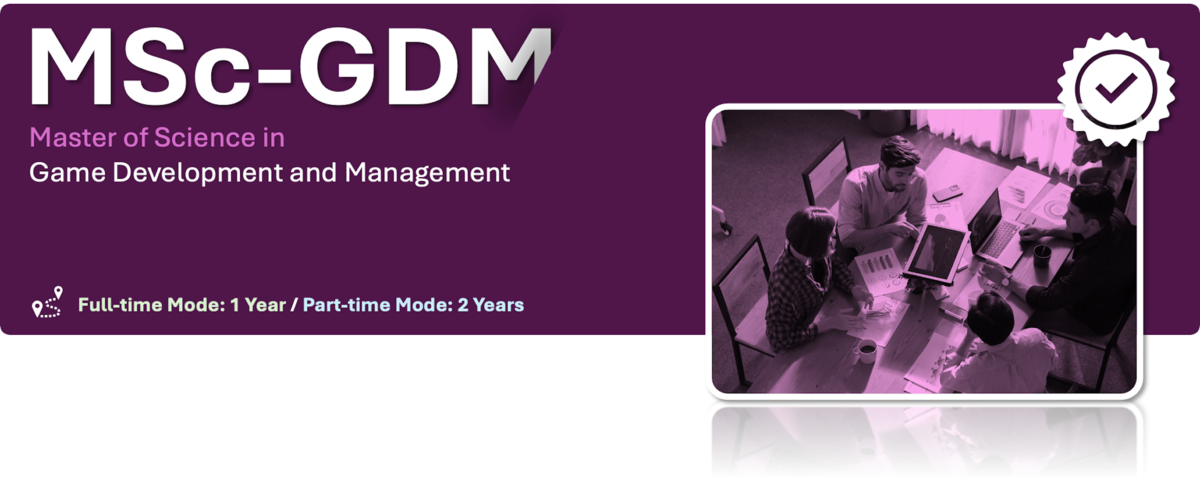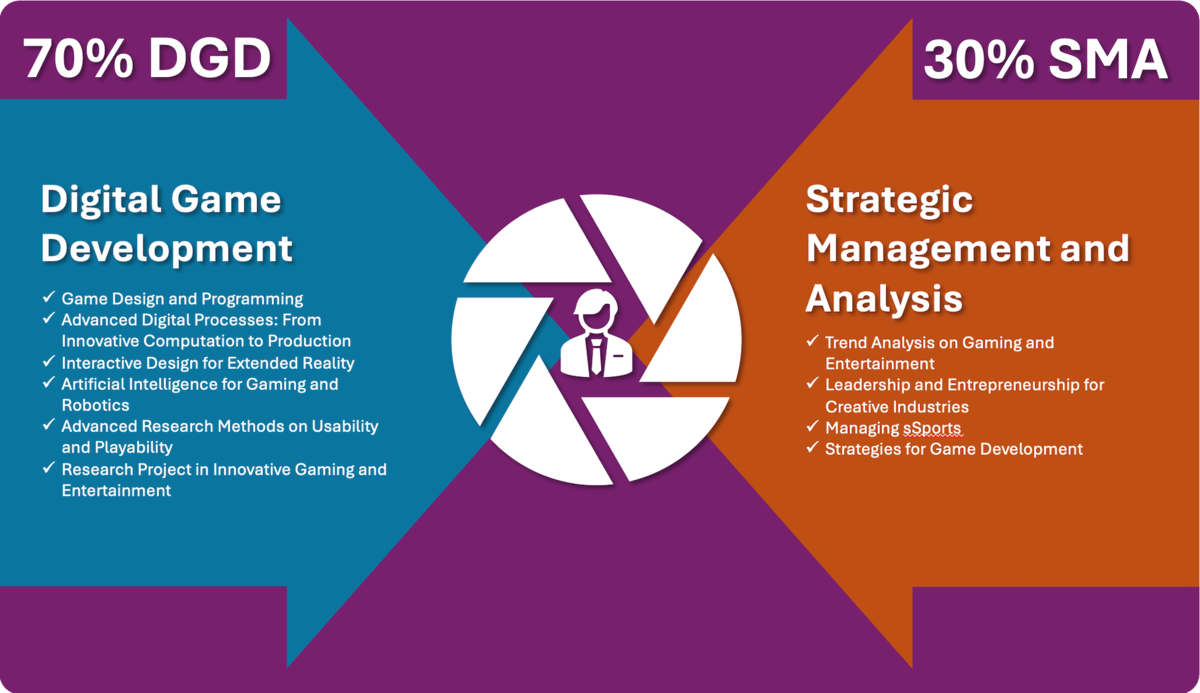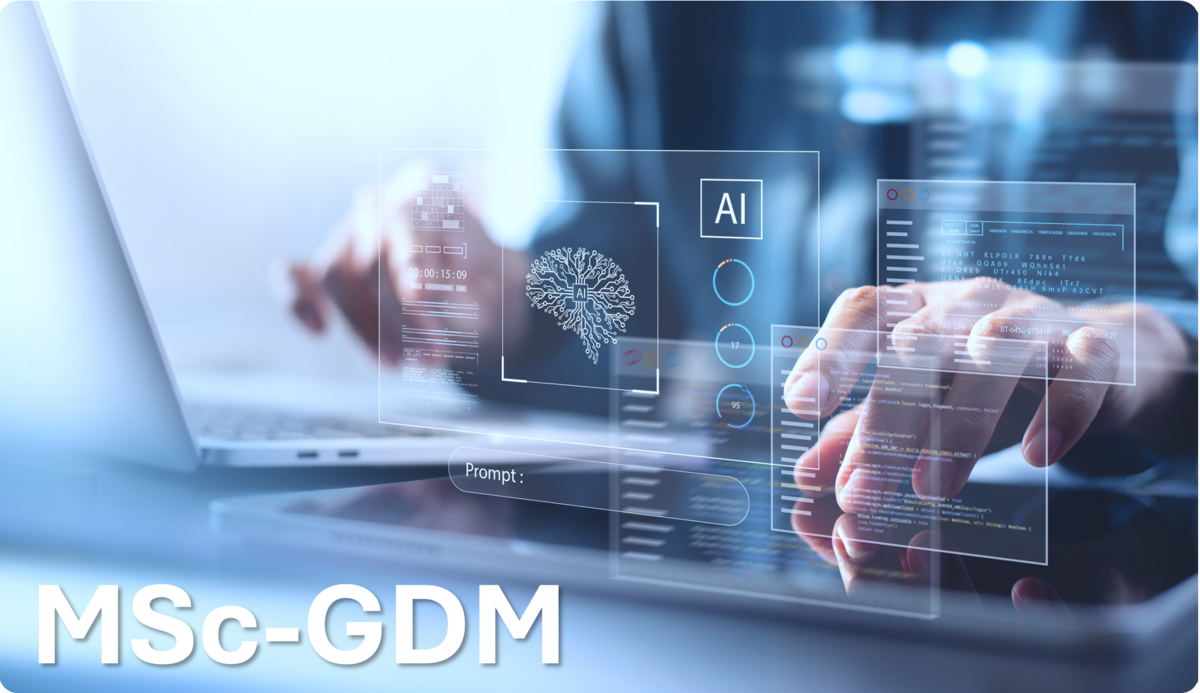
Programme Overview
The Master of Science in Game Development and Management (MSc-GDM) addresses the complexity and specialization of the gaming and digital entertainment landscapes, which have created a demand for new managerial personnel who can understand, apply, develop, research, and manage innovative explorations, technological applications, and production strategies (e.g., game design, game programming, production cycles, artificial intelligence, and eSports). The MSc-GDM programme aims to tackle various socio-economic applications and real-world challenges in business, education, sports, arts, healthcare, and social and community services. In response to market demands, the curriculum design of the MSc-GDM programme incorporates a series of core courses aimed at nurturing talent in these areas.
The MSc-GDM programme offers a distinctive Dual-Cluster Approach, which are 70% Digital Game Development (DGD) courses and 30% Strategic Management and Analysis (SMA) courses, that emphasises digital gaming, entertainment development and artificial intelligence for robotics (AIR), as well as strategic innovation management and. This unique combination ensures that graduates possess a well-rounded skill set that encompasses both technological proficiency and strategic managerial thinking respectively.

The MSc-GDM programme aims to nurture game production managers who can oversee collaborative game development, manage the project effectively, and create competitive solutions for the creative industries.
Research Component and Industry/Technical Research-Informed Project
Research Methodology for Game Development
During the final stage of the MSc-GDM programme, specifically the second semester for full-time students and the fourth semester for part-time students, it is expected that students will have successfully completed a minimum of 15 credits (18 credits for part-time students). At this stage, students will engage in the study of research methodology and undertake an industry/technical research-informed project focused on game design, development, and production. To enhance students' industry/technical research skills, particularly usability and user playability, a core course titled "GDM516 Advanced Research Methods on Usability and Playability" will be introduced. This course aims to facilitate students in developing their own research subjects, fostering higher levels of intellectual ability, critical analysis, rigour, and independent thinking.
Industry/Technical Research-Informed Project in Innovative Gaming and Entertainment
In the final term, MSc-GDM students will be required to undertake an individual Industry/Technical Research-Informed Project through the course titled “GDM 517 Research Project in Innovative Gaming and Entertainment”. This technical research-informed project offers students the opportunity to apply scientific research, experiment with product development, and creatively address real-world challenges in the creative industries. Through active participation in this project, graduates of the programme will gain advanced game development experience that combines academic research with professional practice, giving them a competitive edge in the creative industry sectors. The research-informed project ensures that students are well-prepared for professional practices and equipped with comprehensive research expertise.
Non-credit-bearing Industrial Field Trip (Optional)
During the winter break between the fall and spring semesters of their studies (Year One for full-time students and Year Two for part-time students), students will be given the opportunity to participate in a non-credit-bearing industrial field trip (Optional) organised by the Industrial Attachment Coordinator (IAC). This optional industrial field trip is designed specifically for MSc-GDM students to gain practical industry experience and insights by visiting and exploring various game development companies and related organisations. There will be on-site visits to different game studios, production companies, industry conferences, and other relevant institutes. These visits aim to expose students to the real-world workings of the game development industry and provide them with valuable networking opportunities. Students are encouraged to interact with industry professionals, learn from their experiences and best practices, and gain a deeper understanding of the game development process from inception to release.



